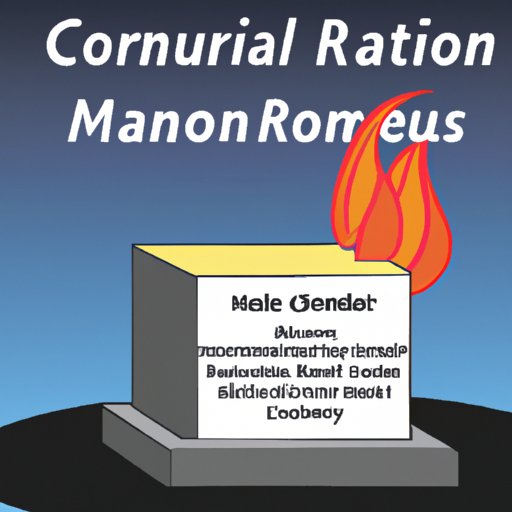Introduction
As more and more people turn to cremation as an alternative to traditional burial, it’s important to understand the associated cost. Cremation is a process of reducing human remains to bone fragments through high-heat incineration. In the US, the average cost of cremation is between $1,000 – $3,000 depending on the type of service chosen and region. This article takes a comprehensive look at the cost of cremation and explores the factors influencing the price.

Exploring the Cost of Cremation: A Comprehensive Guide
When considering cremation services, there are several factors that should be taken into account. It’s important to understand what you need to know about the price of cremation services before making any decisions. Additionally, understanding the average cost of cremation across the US can help you budget accordingly. The following sections provide a closer look at the cost of cremation and related factors.
What You Need to Know About the Price of Cremation Services
The cost of cremation services varies depending on the type of service selected and region. Generally speaking, there are two types of cremation services available: direct cremation and traditional cremation. Direct cremation is a simple and inexpensive process where the body is cremated without a memorial service or visitation. Traditional cremation includes a funeral service or visitation prior to the cremation. Depending on the type of service chosen, additional services such as embalming may also be included in the cost.
How Much Does It Cost to Get Cremated? Breaking Down the Costs
In most cases, the cost of cremation services will include the following:
- Cremation fee – this includes the use of the crematory and the actual cremation process.
- Transportation fees – this covers the transfer of the body from the place of death to the crematory.
- Death certificate – this is necessary for legal reasons and typically costs around $25.
- Memorial service – if desired, a memorial service or visitation can be arranged prior to the cremation. This will typically involve additional costs for renting a space, catering, etc.
- Embalming – if required, embalming fees may apply.

The Average Cost of Cremation: What to Expect
On average, the cost of a direct cremation ranges from $1,000 – $3,000, while a traditional cremation with a memorial service can range from $2,500 – $5,000. These costs vary depending on the region, type of service selected, and other factors such as embalming, transportation, and the number of people attending the service.

The Pros and Cons of Cremation and its Cost
Cremation has become increasingly popular in recent years due to its lower cost and environmental benefits. However, it is important to weigh the pros and cons of cremation before making any decisions.
Benefits of Cremation
- Lower cost than traditional burial
- More flexible than traditional burial
- Environmental benefits
Drawbacks of Cremation
- Not possible to have a viewing
- Not allowed in some religions
- Possibility of limited legal protection
Understanding Cremation Prices Across the US
It’s important to consider regional differences when looking at the cost of cremation services. Cremation prices vary significantly across the US, with prices ranging from as low as $500 in some states to as high as $5,000 in others. Additionally, local laws and regulations can impact the cost of cremation in certain areas.

Making Sense of the Cost of Cremation: A Look at the Financials
When considering the cost of cremation, it’s important to take a closer look at the various factors influencing the price. Some of the most common factors include:
- Type of service selected (direct or traditional)
- Region/location of the crematorium
- Additional services requested (embalming, transportation, etc.)
- Number of people attending the memorial service
In addition to these factors, there are also other expenses related to cremation such as death certificates, obituaries, and memorial items. These costs can add up quickly, so it’s important to be mindful of all associated costs before making any decisions.
Conclusion
Cremation is an increasingly popular option in the US. The cost of cremation services varies depending on the type of service selected and region. On average, the cost of a direct cremation ranges from $1,000 – $3,000, while a traditional cremation with a memorial service can range from $2,500 – $5,000. Additionally, it’s important to consider regional differences, local laws, and other factors influencing cremation costs. Understanding the associated costs and benefits of cremation can help individuals make informed decisions about their end-of-life arrangements.
Summary of Key Points
- Cremation is a process of reducing human remains to bone fragments through high-heat incineration.
- The cost of cremation services varies depending on the type of service selected and region.
- Direct cremation is a simple and inexpensive process, while traditional cremation includes a funeral service or visitation prior to the cremation.
- The cost of cremation services typically includes the use of the crematory, transportation fees, death certificate, memorial service, and embalming.
- On average, the cost of a direct cremation ranges from $1,000 – $3,000, while a traditional cremation with a memorial service can range from $2,500 – $5,000.
- Cremation has both benefits and drawbacks, including lower cost and environmental benefits, but not allowing for a viewing.
- Cremation prices vary significantly across the US, with prices ranging from as low as $500 in some states to as high as $5,000 in others.
- Factors influencing cremation costs include the type of service selected, region, additional services requested, and number of people attending the memorial service.
Final Considerations for the Cost of Cremation
When considering the cost of cremation, it’s important to take a comprehensive approach. Understanding the associated costs and benefits of cremation can help individuals make informed decisions about their end-of-life arrangements. Additionally, considering regional differences, local laws, and other factors can help ensure you get the most value for your money.


